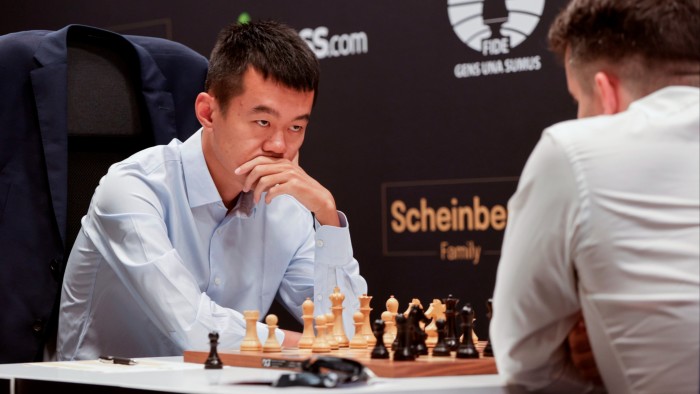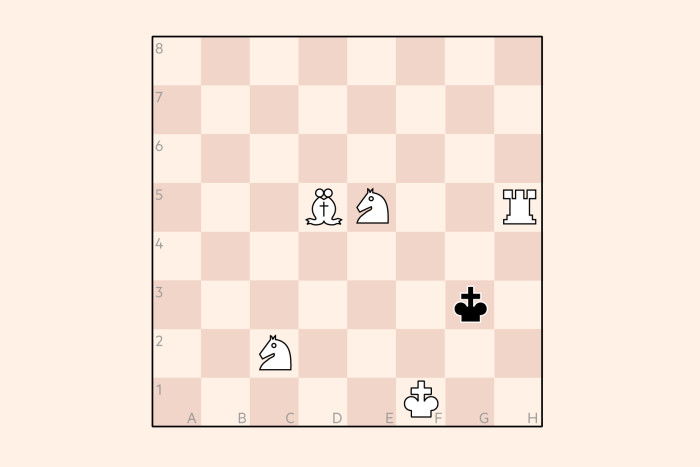Chess world title match starts this weekend

Ian Nepomniachtchi and Ding Liren begin their €2mn 14-game world title match on Sunday at 10am BST in Astana, Kazakhstan. The Russian and Chinese grandmasters, ranked No 2 and 3 in the world, will also be battling the shadow of Norway’s Magnus Carlsen, who has abdicated the crown he won in 2013 and which he successfully defended four times.
Carlsen is still ranked No 1 by a wide margin, and is competing this week in the online Chessable Masters, where he suffered a shock opening defeat on Monday to Russia’s Vladislav Artemiev. He has become disenchanted with the months of preparation required every two years for a title match opponent.
Whoever wins from Nepomniachtchi, 32, and Ding, 30, will therefore face a credibility problem. There have been 48 title matches and tournaments since official world championships began in 1886, and the then No 1 has been involved in all but two or three of them.
The Russian is the slight favourite, because he already has experience at the highest level in winning two Candidates tournaments. His 2021 challenge to Carlsen collapsed with a string of second-half defeats, but negative experiences can still be useful. Both Vasily Smyslov, in 1954-57, and Boris Spassky, in 1966-69, won the world title on their second attempts.
On his form before Covid, Ding would probably have been preferred, as he was ultra-solid and had a run of 100 games unbeaten in 2017-18, the longest such in top-level chess until Carlsen reached 125. However, Ding was often caught up in prolonged lockdowns in his home city of Wenzhou during the pandemic, and since he resumed playing his results have become less stable.
Nepomniachtchi’s career also shows moments of what the commentator and former Fide champion Alexander Khalifman calls “mental instability in extreme situations: if something suddenly goes wrong, both can falter and crumble”.
Nepomniachtchi may have the edge when it comes to opening preparation, a key element in any close contest. Before and during his Candidates victories and his match with Carlsen, the Muscovite had access to the Zhores supercomputer, based in Moscow’s Skolkovo Institute of Technology, helping him and his team to evaluate opening positions and thus secure an early advantage on the board. Zhores’s main use is for scientific research into machine learning and artificial intelligence, but it has also been adapted for Nepomniachtchi’s purposes.
Chess engines, especially the popular Stockfish, are now an essential tool for every grandmaster. Carlsen was several times under slight pressure in the openings in the 2021 title match, but found ways to neutralise the threats.
Nepomniachtchi is a late developer at the highest levels, crediting an improvement in mindset for changing from a gifted but inconsistent player into a true contender for the crown. He used to be the least hardworking GM in the top 20, but approaching his 30th birthday he realised that he had done nothing special and adopted a more serious approach. He also succeeded in correcting an overconfidence problem that had dogged him for years.
Ding has been at or near the top of Chinese chess for more than a decade, after an unusual stroke of fortune. He was an untitled 16-year-old in the 2009 Chinese championship, was half a point behind the leader Wang Hao at the start of the final round, and faced the experienced master Zhou Jianchao. At that time there was an official Fide directive of zero tolerance for late arrivals, which zealous Beijing officials interpreted so literally that Zhou, arriving a few seconds after the gong, was instantly defaulted and Ding won the first of his three Chinese titles.
After that boost, Ding’s career steadily advanced, although he still took a law degree at Beijing University before he broke into the world top 10 at age 22. His advance stalled at the Candidates, where he finished fourth in 2018 but only tied fifth in 2020-21 after a poor start. In the 2022 Candidates he finally came good and his second place ensured him a world title chance due to Carlsen’s withdrawal.
Who will become world champion? Nepomniachtchi’s recent career record, especially his two Candidates successes, is slightly more convincing and I expect him to win by around 7.5-5.5.
Puzzle 2514

White mates in three moves (by Sam Loyd, 1889) Just a single line of play with all Black’s replies forced, but you will do well to crack it in five minutes.
For solution, click here
Letter in response to this article:
A chess fan ponders Carlsen’s next move / From Brad Starr, London SE15, UK
Comments